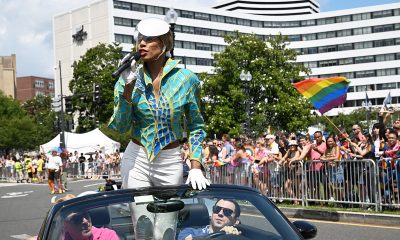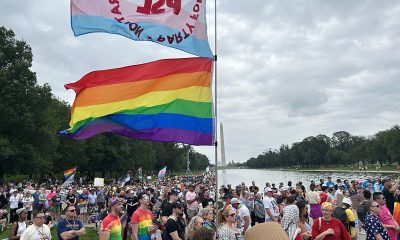World
Russian lesbian athlete: ‘We are visible to our gov’t’
State Dept. brings leader of Moscow LGBT sports group to U.S.
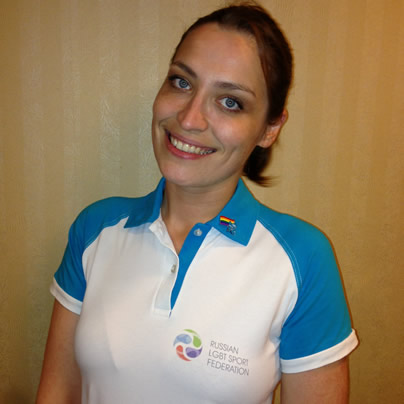
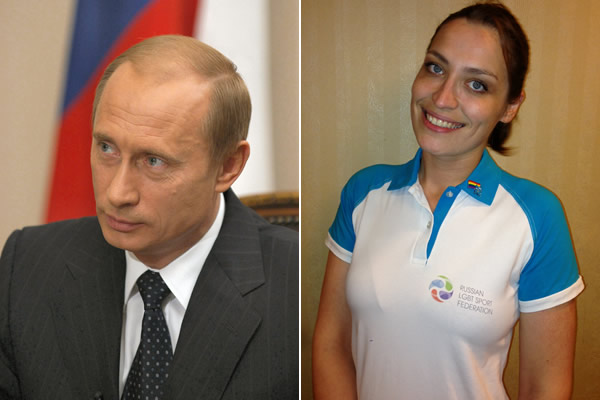
Russian President Vladimir Putin is under fire for his anti-gay policies, but lesbian Russian athlete Elvina Yuvakaeva says the government recognizes her LGBT group, which is planning a first-ever LGBT sports competition in Moscow next year. (Photo of Putin courtesy of www.kremlin.ru; Photo of Yuvakaeva courtesy of Yuvakaeva)
In a little noticed development, the U.S. Embassy in Moscow last month selected one of the leaders of a Russian LGBT sports group to participate in a sports exchange program in the U.S. organized by the State Department.
Lesbian athlete Elvina Yuvakaeva, co-president of the Russian LGBT Sport Federation, arrived in Washington last week with a five-member delegation of Russians working on the 2014 Winter Olympics set to take place in Sochi, Russia Feb. 7-23.
Under the State Department’s International Visitor Leadership Program, Yuvakaeva and the Russian delegation will visit several cities to meet with professional U.S. sports teams and organizers of past Olympics games in Atlanta and Salt Lake City. The meetings are aimed at providing information helpful to the Russians’ effort to promote and carry out the Olympic Games in Sochi.
Yuvakaeva said she will also be meeting with U.S. organizers of the 2014 Gay Games, the quadrennial international LGBT sports competition scheduled to take place next summer in Cleveland. In addition, she said she will make use of her U.S. visit to promote a first-ever LGBT sports competition her organization is planning to hold in Moscow next March called the Open Games.
“Two years ago our organization was registered as an NGO [non-governmental organization] by our government,” Yuvakaeva told the Blade in a Sept. 15 interview. “And our small victory was in the papers,” she said, noting that the registration of organizations in Russia is considered a form of government recognition.
“In our papers the government saw that L means lesbian, G means gay, B means bisexual, and T means transgender,” she said. “So we understood that the government saw us and we are visible to our government and society.”
A State Department spokesperson on Tuesday declined to comment on the potential political significance of the selection of a lesbian sports activist for the U.S. exchange program.
Observers of the controversy surrounding calls by some LGBT activists in the U.S. and Europe for a boycott of the Sochi Olympics in response to a recently passed Russian law that critics say subjects gays to persecution are likely to view Yuvakaeva’s selection as a signal of U.S. opposition to Russia’s policies on gays.
President Obama, who has expressed concern about Russia’s so-called “gay propaganda” law, included Russian LGBT activists as part of a contingent of representatives of Russian civic organizations with whom he met during his recent participation in the G-20 international economic summit in St. Petersburg.
“Quite frankly, I’m not going to get into a political thing like that,” said Susan Pittman, director of media relations for the State Department’s Bureau of Education and Cultural Affairs.
“I would merely reiterate that these people are selected after their applications are in and they’re reviewed by the embassy and the consulates,” she told the Blade.
“These particular programs – we have a number of them throughout the year,” Pittman said. “They include emerging leaders in a variety of fields – in professions, in sports, in the arts, in culture. The whole idea is to bring these people here in order to be able to establish relationships with their American counterparts.”
Yuvakaeva said a U.S. Embassy official approached her and invited her to apply for the exchange program in August while she attended an embassy reception. The reception, to which she had been invited, was held at the embassy in honor of U.S. athletes participating in the 2013 International Association of Athletics Federations (IAAF) track and field competition that took place Aug. 10-18 in Moscow.
Among those attending the reception, Yuvakaeva said, was American runner Nick Symmonds, who created a stir when he spoke out against the Russian law against gay propaganda after receiving a silver medal in the competition. Sports writers said Symmonds, who is gay, became the first international athlete to criticize the gay propaganda law while on Russian soil.
Yuvakaeva said the Russian LGBT Sport Federation was founded in 2010 as a non-political organization with the purpose of promoting and facilitating sports among Russia’s LGBT community. Among other things, it serves as a representative of the Russian LGBT community on the board of the International Federation of Gay Games.
She said Russian authorities have not sought to revoke the group’s registration following the approval earlier this year by the Russian parliament of the gay propaganda law, which Russian officials have said is aimed at protecting minors from homosexuality.
According to Yuvakaeva, authorities consider the Russia LGBT Sport Federation to be in compliance with both the propaganda law and a separate law banning certain organizations from receiving money from foreign groups or governments on grounds that the Russian sports group is non-political.
“The only thing is we couldn’t invite minors to our events and we wouldn’t spread some information among minors about our events because it’s outlawed,” she said in discussing the impact of the gay propaganda law on her group.
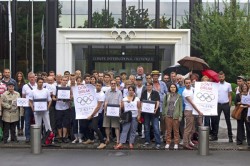
Members of All Out and Athlete Ally last month presented a petition to the IOC that urges it to pressure Russia to end its anti-gay laws. (Photo courtesy of All Out)
Concerning the Sochi Olympics, Yuvakaeva said the Russian LGBT Sport Federation opposes calls for a boycott on grounds that it would have a negative impact on the athletes and the LGBT community.
“My position and our official position is that a boycott of Sochi is a bad idea because the Olympics is a big event which is held every four years,” she said. “So Olympic athletes are preparing for this event a minimum of four years and it means Olympic athletes cannot compete and don’t have an opportunity to win medals.”
She said her organization also believes a boycott would have a negative impact on public opinion of the LGBT community in Russia and elsewhere.
“Our suggestion is to ask athletes, for example, at the opening ceremony to hold hands,” she said. “Same-sex people can hold hands during the opening ceremony to support LGBT people in Russia and all people.”
Although she won’t use her U.S. visit to campaign against a boycott, she said she will make her views known on the subject when she meets with LGBT sports representatives in the various U.S. cities to which she will travel through this month.
Among her priorities during her U.S. visit will be to promote and possibly raise money for the upcoming Open Games next year in Moscow, Yuvakaeva said. In what could be another first, she said she will ask officials of the Coca-Cola Company to consider contributing money for the Open Games when she and the Russian delegation meet company officials during their visit this week to Atlanta.
The delegation was scheduled to meet the Coca-Cola officials in connection with the company’s role as a sponsor of the Sochi Olympics.
“I want to ask Coca-Cola about these funds because they can make a PR campaign that says, OK guys, we’re sponsors of the Sochi Olympics. And in the same situation we support LGBT athletes in Russia because we gave some money for the Russian Open Games,” she said.
“So I think it might be interesting for them,” Yuvakaeva said. “We’ll see.”
While Yuvakaeva visits various U.S. cities in her participation in the State Department’s exchange program, Konstantin Yablotski, the other co-chair of the Russian LGBT Sport Federation, is in Los Angeles promoting the Open Games on the West Coast.
Yablotski, a figure skater who competed in the 2010 Gay Games in Germany, and Yuvakaeva, an avid snowboarder and badminton player, are each committed to advancing LGBT equality in Russia through sports, Yuvakaeva told the Blade.
She said the sports planned for the Open Games, for which both LGBT people and heterosexual athletes are invited, are track and field, basketball, volleyball, badminton, soccer, tennis, table tennis, swimming and cross-country skiing.
Yuvakaeva said that while foreign athletes would be welcome to participate in the Open Games, her organization was still deliberating over the extent to which foreign participation may be possible due to logistical limitations and security and safety issues.
“Our main goal is propaganda for a healthy sports lifestyle among the LGBT and society,” she said.
South Africa
South African activists demand action to stop anti-LGBTQ violence
Country’s first gay imam murdered in February
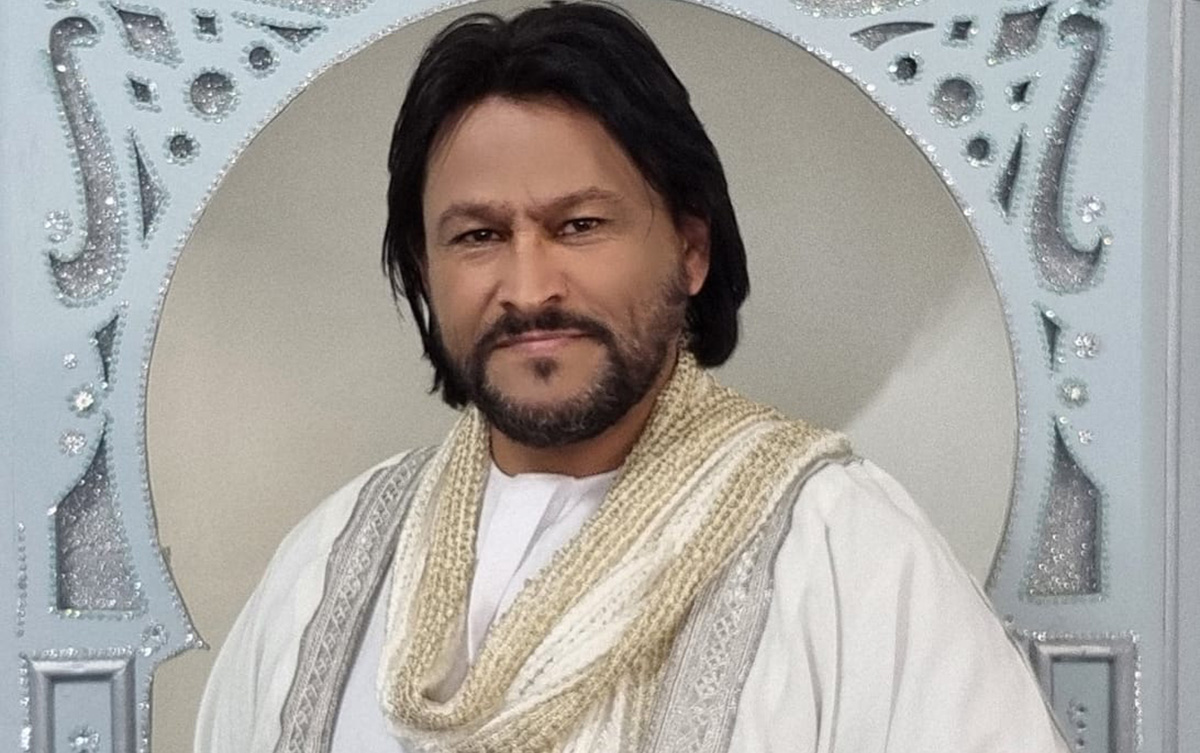
Continued attacks of LGBTQ South Africans are raising serious concerns about the community’s safety and well-being.
President Cyril Ramaphosa in May 2024 signed the Preventing and Combating of Hate Crimes and Hate Speech Bill into law that, among other things, has legal protections for LGBTQ South Africans who suffer physical, verbal, and emotional violence. Statistics from the first and second quarters of 2025 have painted a grim picture.
Muhsin Hendricks, the country’s first openly gay imam, in February was shot dead in Gqeberha, in a suspected homophobic attack. Authorities in April found the body of Linten Jutzen, a gay crossdresser, in an open field between an elementary school and a tennis court in Cape Town.
A World Economic Forum survey on attitudes towards homosexuality and gender non-conformity in South Africa that Marchant Van Der Schyf conducted earlier this year found that even though 51 percent of South Africans believe gay people should have the same rights as their heterosexual counterparts, 72 percent of them feel same-sex sexual activity is morally wrong. The survey also notes 44 percent of LGBTQ respondents said they experienced bullying, verbal and sexual discrimination, and physical violence in their everyday lives because of their sexual orientation.
Van Der Schyf said many attacks occur in the country’s metropolitan areas, particularly Cape Town, Durban, and Johannesburg.
“Victims are often lured to either the perpetrator’s indicated residence or an out-of-home area under the appearance of a meet-up,” said Van Der Schyf. “The nature of the attacks range from strangulation and beatings to kidnapping and blackmail with some victims being filmed naked or held for ransom.”
The Youth Policy Committee’s Gender Working Group notes South Africa is the first country to constitutionally protect against discrimination based on sexual orientation and the fifth nation in the world to extend marriage rights to same-sex couples. A disparity, however, still exists between legal protections and LGBTQ people’s lived experiences.
“After more than 20 years of democracy, our communities continue to wake up to the stench of grief, mutilation, violation, and oppression,” said the Youth Policy Committee. “Like all human beings, queer individuals are members of schooling communities, church groups, and society at large, therefore, anything that affects them should affect everyone else within those communities.”
The Youth Policy Committee also said religious and cultural leaders should do more to combat anti-LGBTQ rhetoric.
“Religious institutions seem to perpetuate the hate crimes experienced by queer individuals,” said the group. “In extreme cases, religious leaders have advocated for killings and hateful crimes to be committed against those in the queer community. South Africa’s highly respected spiritual guides, sangomas, are also joining the fight against queer killings and acts of transphobia and homophobia.”
“The LGBTQIA+ community is raising their voice and they need to be supported because they add a unique color to our rainbow nation,” it added.
Steve Letsike, the government’s deputy minister for women, youth, and persons with disabilities, in marking the International Day Against Homophobia, Biphobia, and Transphobia on May 17 noted Ramaphosa’s administration has enacted legislative framework that protects the LGBTQ community. Letsike, however, stressed the government still needs to ensure its implementation.
“We have passed these policies and we need to make sure that they are implemented fully and with urgency, so that (LGBTQ) persons can self-determine and also have autonomy without any abusive requirements,” said Letsike. “We need families, faith leaders, traditional authorities, and communities to rise together against hate. Our constitution must remain respected.”
Siphokazi Dlamini, a social justice activist, said LGBTQ rights should be respected, as enshrined in the constitution.
“It is terrible to even imagine that they face discrimination despite the fact that this has been addressed numerous times,” said Dlamini. “How are they different from us? Is a question I frequently ask people or why should they live in fear just because we don’t like the way they are and their feelings? However, I would get no response.”
Dlamini added people still live in fear of being judged, raped, or killed simply because of who they are.
“What needs to be addressed to is what freedom means,” said Dlamini. “Freedom means to have the power to be able to do anything that you want but if it doesn’t hurt other people’s feelings while doing it. There is freedom of speech, freedom from discrimination, freedom of expression, of thought, of choice, of religion, of association, and these needs to be practiced. It is time to take such issues seriously in order to promote equality and peace among our people, and those who do not follow these rules should be taken into custody.”
Van Der Schyf also said LGBTQ South Africans should have a place, such as an inquiry commission, that allows them to talk about the trauma they have suffered and how it influences their distrust of the government.
Chile
Gay pharmacist’s murder sparks outrage in Chile
Francisco Albornoz’s body found in remote ravine on June 4

The latest revelations about the tragic death of Francisco Albornoz, a 21-year-old gay pharmacist whose body was found on June 4 in a remote ravine in the O’Higgins region 12 days after he disappeared, has left Chile’s LGBTQ community shocked.
The crime, which was initially surrounded by uncertainty and contradictory theories, has taken a darker and more shocking turn after prosecutors charged Christian González, an Ecuadorian doctor, and José Miguel Baeza, a Chilean chef, in connection with Albornoz’s murder. González and Baeza are in custody while authorities continue to investigate the case.
The Chilean Public Prosecutor’s Office has pointed to a premeditated “criminal plan” to murder Albornoz.
Rossana Folli, the prosecutor who is in charge of the case, says Albornoz died as a a result of traumatic encephalopathy after receiving multiple blows to the head inside an apartment in Ñuñoa, which is just outside of Santiago, the Chilean capital, early on May 24. The Prosecutor’s Office has categorically ruled out that Albornoz died of a drug overdose, as initial reports suggested.
“The fact that motivates and leads to the unfortunate death of Francisco is part of a criminal plan of the two defendants, aimed at ensuring his death and guaranteeing total impunity,” Folli told the court. “The seriousness of the facts led the judge to decree preventive detention for both defendants on the grounds that their freedom represents a danger to public safety.”
Prosecutors during a June 7 hearing that lasted almost eight hours presented conservations from the suspects’ cell phones that they say showed they planned the murder in advance.
“Here we already have one (for Albornoz.) If you bring chloroform, drugs, marijuana, etc.,” read one of the messages.
Security cameras captured the three men entering the apartment where the murder took place together.
Hours later, one of the suspects left with a suitcase and a shopping cart to transport Albornoz’s body, which had been wrapped in a sleeping bag. The route they followed to dispose of the body included a stop to buy drinks, potato chips, gloves, and a rope with which they finally descended a ravine to hide it.
Advocacy groups demand authorities investigate murder as hate crime
Although the Public Prosecutor’s Office has not yet officially classified the murder as a hate crime, LGBTQ organizations are already demanding authorities investigate this angle. Human rights groups have raised concerns over patterns of violence that affect queer people in Chile.
The Zamudio Law and other anti-discrimination laws exist. Activists, however, maintain crimes motivated by a person’s sexual orientation or gender identity are not properly prosecuted.
“This is not just a homicide, it is the cruelest expression of a society that still allows the dehumanization of LGBTQ+ people,” said a statement from Fundación Iguales, one of Chile’s main LGBTQ organizations. “We demand truth, justice, and guarantees of non-repetition.”
The Movement for Homosexual Integration and Liberation (Movilh), meanwhile, indicated that “since the first day the family contacted us, we have been in conversations with the Prosecutor’s Office so that this fatal outcome is thoroughly investigated, including the possible existence of homophobic motivations or components.”
The investigation into Albornoz’s murder continues, and the court has imposed a 90-day deadline for authorities to complete it.
Japan
Japan should end abusive detention conditions for transgender people
Mistreatment exacerbated by ‘hostage justice’ system
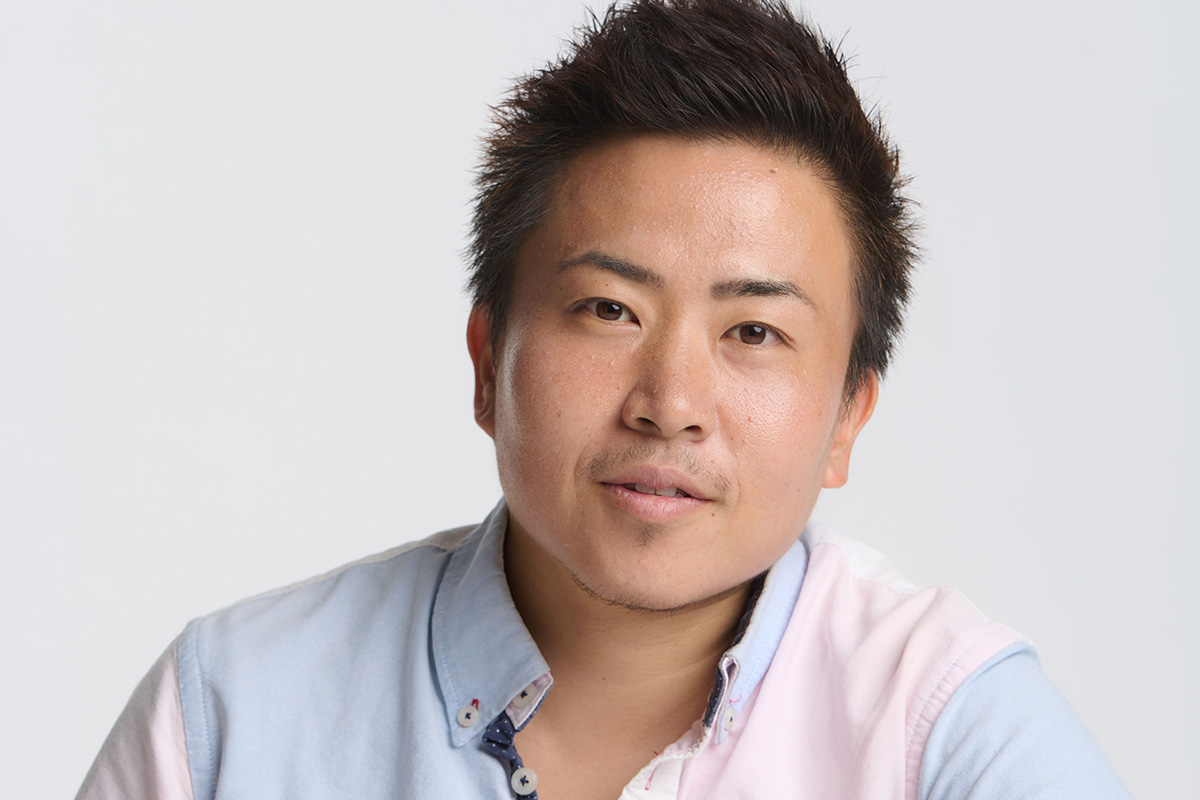
Tomoya Asanuma, a prominent transgender activist in Tokyo, faced the triple abuses of Japan’s “hostage justice” system, hostile detention conditions, and mistreatment trans people face in the absence of meaningful legal protections.
For Asanuma, March 14, 2024, was supposed to be another Thursday at work. At around 7 a.m., he woke up to the sound of someone repeatedly ringing his doorbell. Through the intercom, Asanuma saw three men wearing dark-colored clothes, this time pounding his front door. When he opened the door, the men identified themselves as police officers and showed him an arrest warrant.
This was the beginning of what Asanuma recently described to Human Rights Watch as being “difficult to put into words.” After Japanese police arrested him for sexual assault for allegedly hugging an acquaintance from behind, the authorities held him for months at a pre-trial detention center.
During this time, they mocked his transgender identity during interrogation, denied him access to medical services such as dental care, and initially denied hormone treatment until he obtained a recommendation from a doctor.
While some authorities showed a level of consideration for Asanuma, including letting him shower away from other detained men, the abusive treatment he faced led him to attempt suicide twice.
Trans people in Japan are in legal limbo. Historically, they have faced outright discrimination — including a law compelling them to be surgically sterilized for legal gender recognition — and barriers to accessing education, employment, and health care. A landmark Supreme Court decision in 2023 declared the sterilization requirement unconstitutional, but reform has stalled in parliament — leaving trans people’s basic rights in limbo.
The courts finally granted bail to Asanuma in July 2024 and found him not guilty in January 2025. But in a country with a 99.8 percent conviction rate for indicted cases, Asanuma had to live through acute fear as authorities forcibly tried to obtain a confession from him during interrogations without the presence of his lawyer.
His fears are grounded in a justice system with a well-earned reputation for abuse and arbitrariness. His experience is part of systemic treatment in Japan called “hostage justice,” under which criminal suspects are detained for prolonged periods, sometimes months or years, unless they confess to the charges. This denies them the rights to due process and a fair trial.
The authorities ultimately dropped the sexual assault allegations, but charged Asanuma with assault, which is punishable by up to two years in prison or up to a 300,000 yen fine ($2,000.) Prosecutors sought a 200,000 yen fine. Despite this, because he pleaded not guilty, a court rejected his request for bail four times and detained him for more than 100 days in pre-trial detention, punishing him disproportionately since the prosecutors did not even seek imprisonment for his alleged crime.
In Japan’s hostage justice system, authorities frequently subject suspects to harsh interrogations to coerce confessions from them during pre-indictment detention. Defense lawyers are not permitted to be present, and the questioning does not stop even when a suspect invokes their constitutional right to remain silent. Indeed, Asanuma invoked his right to remain silent, but authorities interrogated him for hours on 13 occasions.
The case of Iwao Hakamata highlights the dangers of this practice. Hakamata, a former professional boxer, was arrested on Aug. 18, 1966, for murdering a family of four. Following harsh interrogations by the police and prosecutors, he confessed nearly a month later. Based on this coerced confession, Hakamata was indicted and subsequently convicted and sentenced to death. He maintained his innocence and was eventually acquitted — 58 years after his arrest — on Sept. 26, 2024, following a retrial.
To prevent further abuses and wrongful convictions spurred by the “hostage justice” system, the Japanese government should not as a general rule deny bail to suspects in pretrial detention, and should end interrogations without legal counsel that often involve coerced confessions through manipulation and intimidation.
The Japanese government should also improve the conditions under which suspects are being held, including by ensuring adequate access to all medical services, and revising the Notice Regarding Treatment Guidelines for Detainees with Gender Identity Disorder by specifying that hormone replacement therapy and other gender-affirming medical interventions are medically necessary and should be made available to all imprisoned people who want them.
“My case is just the tip of the iceberg, as there are others who are detained much longer,” Asanuma said. “I think this experience gave me a good reason to speak up even more for the rights of suspects going forward,” he added.
Teppei Kasai is a program officer for Japan at Human Rights Watch.
-
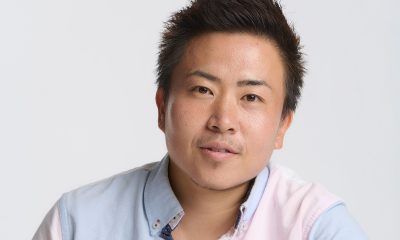
 Japan5 days ago
Japan5 days agoJapan should end abusive detention conditions for transgender people
-
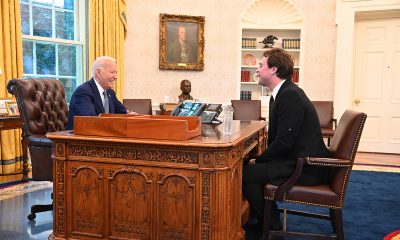
 Opinions5 days ago
Opinions5 days agoI interviewed Biden in late 2024 and he was attentive, engaged
-
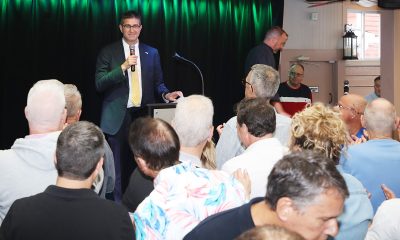
 Delaware5 days ago
Delaware5 days agoDelaware Gov. Meyer announces LGBTQ commission
-

 World Pride 20255 days ago
World Pride 20255 days agoU.S. Park Service closes Dupont Circle Park for WorldPride weekend

